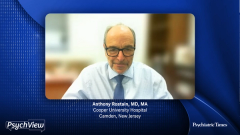
Adult ADHD: Substance Abuse Challenges
Theresa Cerulli, MD, and Anthony Rostain, MD, MA, discuss challenges with substance abuse related to pharmacologic interventions for adult attention-deficit/hyperactivity disorder (ADHD) treatment.
Episodes in this series

Theresa Cerulli, MD: This leads me to my next question. Can you discuss substance abuse challenges with pharmacologic intervention, particularly with treating adults with ADHD [attention-deficit/hyperactivity disorder]?
Anthony Rostain, MD, MA: Right. This is the big issue on the table all the time for practitioners. How well do you know your patient? How likely are they to have had problems in the past with substance misuse and abuse? We do have to be very candid with everybody that these medications can be misused and abused, and they can be sold. So, trying to be, as much as I can, be sure that I know what’s going on with the patient. If I have any doubt about their being honest or being ready to take a stimulant medication, I might begin with a nonstimulant, if I think they have a history that might make it hard for them to keep to the treatment guidelines. And I try to avoid immediate-release medications because those can be much more easily abused.
I have a lot of close colleagues in the substance abuse world, and leaders like Frances Levin, MD, at Columbia University have pointed out that the proper use of stimulants can reduce certain forms of substance use disorder. A, there has to be a comprehensive treatment plan in place; and B, the patients sign in on being monitored for what they’re taking and being sure that they’re not engaging in other substances. There has to be some commitment to a substance use disorder protocol.
Then finally, I would say that if there are comorbid conditions that are also underlying this issue, you’d treat those as well. Because oftentimes, the patient will need other medications in addition to a stimulant. I wouldn’t treat a patient who has active substance use disorder with a stimulant.
Theresa Cerulli, MD: Yes, good point. Are there any other parameters or suggestions to be able to ensure proper use? People ask, “Do I need to see the patients every month?” And really, my understanding, and the guidelines for diagnosis and treatment management with ADHD, again, based more on children, and unfortunately, we don’t have adult guidelines yet….
Anthony Rostain, MD, MA: Soon, we will get them soon.
Theresa Cerulli, MD: Yes, soon. Are there any recommendations you can make about what might go down in those guidelines? The way I’ve followed along in my practice is to follow up monthly in the beginning. And once the patient is then stable, using the child guidelines of follow-up every 3 or no more than 4 months.
Anthony Rostain, MD, MA: Yes, that’s exactly what I do. Now, here’s the thing. We’re not police, and we can’t monitor everything that people do. But if the patient’s losing their prescriptions or it’s running out before the end of the month, that’s when you need to have a heart-to-heart talk. Because oftentimes, that may be the person who is, if not abusing, maybe just misusing the stimulant. And that’s something, especially with college-age students who have a lot of pressure on them to stay up and party. And they’ll take their ADHD medication instead of just during the day, they’ll use it at night. These are patterns that lead to more serious misuse. But I would say that the index of suspicion is really the only thing we can go on, if something is telling us this person isn’t fully engaged in treatment, they’re asking for immediate-release preparations. These are red flags.
Theresa Cerulli, MD: Anthony, you just hit on a subject near and dear to my heart when you said college and ADHD. My whole passion for this field started with my daughter who has ADHD, a 17-year-old senior in high school, now applying to colleges. We’re spending a lot of time talking about this issue with managing ADHD and certainly around the safety of stimulant medications.
Transcript edited for clarity
Newsletter
Receive trusted psychiatric news, expert analysis, and clinical insights — subscribe today to support your practice and your patients.










